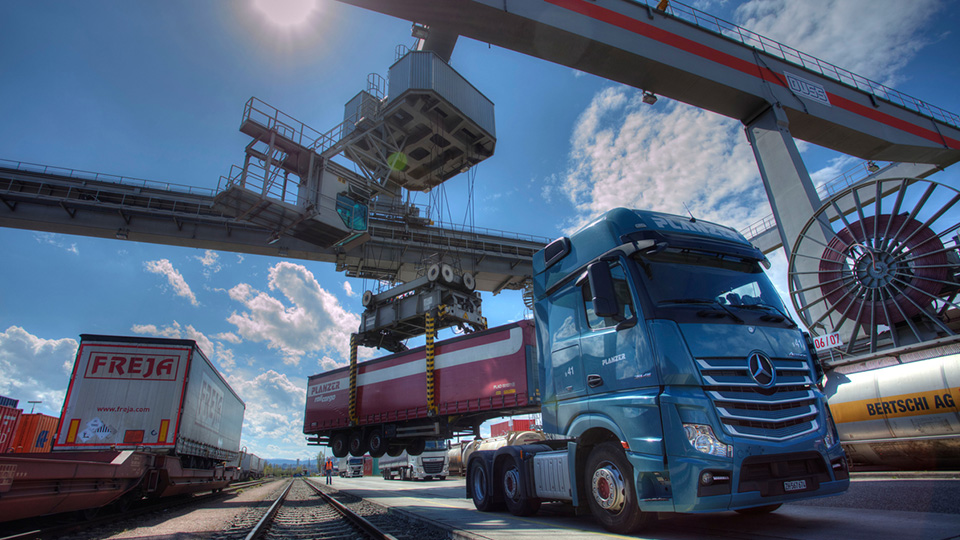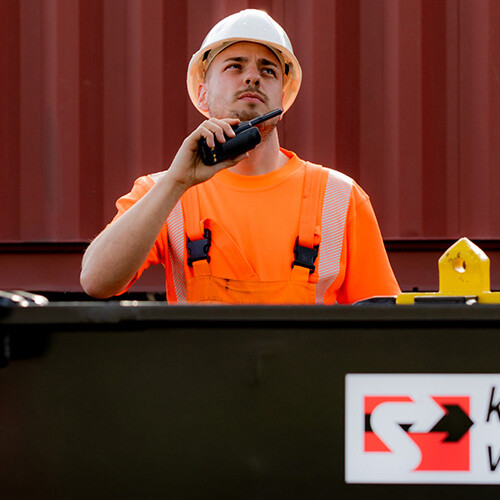(Frankfurt/Main, 22 February 2024) Kombiverkehr KG ended the 2023 financial year with a total of 815,467 truckloads (one load corresponds to the capacity of a truck-trailer combination), or 1.63 million TEU, shifted from the road to climate-friendly rail. This means that 15.9 per cent fewer containers, swap bodies and semitrailers in total were transported compared with the previous year. Within the two National Transport and International Transport business units, consignment volumes came to 186,856 truckloads (-10.1 per cent) and 628,611 truckloads (-17.5 per cent) respectively. In total, 19 million gross tonnes of goods were shipped on climate-friendly rail. That means customers of the Frankfurt company saved 1.2 million tonnes of carbon dioxide through their intermodal commitments last year alone.
Overall situation acute due to weakening EU economy, strikes, cost pressures and declining quality
Following a slight improvement in performance in 2022, the company's business results in the last financial year were adversely affected in particular by the decline in demand for national and international transport services, declining quality due to engineering works on the rail network, strikes in France and Germany, as well as weather-related effects in Alpine transport and the temporary closure of the Gotthard base tunnel. “These negative factors have even intensified in some areas and, coupled with high cost pressures caused by rerouting services and enormous energy costs for the railways, have led to an acute situation overall. Unfortunately, this is set to continue until the end of the year,” says Armin Riedl, managing direct or Kombiverkehr KG. The Frankfurt operator had already had to adjust its transport prices at the beginning of 2023 and levy an additional energy supplement, which in turn negatively impacted its competitiveness and caused the price gap between road and rail to widen further.
Kombiverkehr also sees a lack of planning certainty for companies in the sector and CT users with regard to train path price subsidies. The current situation in the federal budget, with cutbacks in funding for rail freight transport as well, is now making the use of train paths more expensive again for operators and freight forwarders. “Funding that is actually targeted at significantly increasing the market share of rail in terms of CO2 savings in the future is therefore almost obsolete. These will not make it any easier for us as an operator to achieve a short and medium-term turnaround in business development, particularly as far-reaching renovation measures are also due to be carried out this year on important route sections in Germany, which will likewise have a major impact on the price-performance ratio in Combined Transport,” adds Heiko Krebs, his fellow managing director.
Decisions at EU level of huge importance and crucial to the future of Intermodal Transport
As part of its push towards CO2 neutrality, the Commission is preparing to completely restructure the transport sector in the EU with its “Greening Freight Package”, an element of the “Green Deal”. Not only are the directives on weights and measures and the CT directive to be reissued to this end, but all external costs in the transport sector are also to be completely internalised. “In principle, we very much support the new directives, because they will finally bring clarity to some important issues facing the industry that have long been ignored. We also see an opportunity for a level playing field in which each mode of transport can utilise its specific advantages within the framework of a functioning market. At the same time, though, we see a huge risk that the plans could get stuck halfway and thus cement the imbalance between road and rail. And this is exactly what is now threatening to happen – partly because the Commission only introduced the new regulations into the process in the final stages of the legislative period,” says Riedl, expressing his concerns about further progress in the ongoing negotiations. The revision of the CT directive must also necessarily be considered in conjunction with the adaptation of the directive for weights and measures and “count emissions”. “With regard to the latter in particular, we are campaigning for all external costs to be included in the calculation of emissions and efficiency, and not just carbon dioxide. We also warn against endless bureaucracy when assessing which mode of transport is ecologically efficient and therefore eligible for funding. We are in favour of a simple, pragmatic and practical approach to the issue that does not burden users of Combined Transport with additional costs,” Riedl goes on.
Automated handling in terminals now in progress
The Frankfurt operator has joined forces with Deutsche Umschlaggesellschaft Schiene-Straße (DUSS) and Kombi-Terminal Ludwigshafen to push ahead with the digital handling of loading units in terminals. The long-term goal is to make driver processing completely automated and therefore contactless, so that deliveries and collections can be made without truck drivers having to stop. This will ultimately help to streamline and speed up the process. The terminals’ driver’s app already allows this at the stations in Ludwigshafen, Nuremberg, Duisburg, Hamburg, Kornwestheim, Munich and Ulm. “In mid-January, we also launched a two-month pilot project at the Leipzig terminal together with DUSS to simplify handling for trucks delivering and collecting goods. At the moment more than 80 per cent of the loading units are running successfully in the test system. In the future we want to offer processing via the driver’s app for loading units with hazardous goods as well. Unfortunately, there is still no digital consistency in the identification of these transports at the truck gate, which means that they have to be processed manually at the counter,” says Heiko Krebs, highlighting not only the progress made in this digitalisation project but also other important stages in the roll-out. In parallel, there are also plans to develop a comparable digital information process via the CT 4.0 data hub so that freight forwarders can participate in contactless handling via their own systems in the future.
Sweden, Turkey and Greece products expanded
Kombiverkehr KG expanded its product range on two transport corridors at the start of the year. Since the beginning of January, customers from the freight forwarding and logistics sectors have enjoyed greater flexibility in the scheduling of their intermodal transports in southeast European services to and from Turkey and Greece. The company increased the frequency of departures on the Munich – Trieste v.v. route from three to five weekly round trips. From the Port of Trieste, the port terminals of Pendik, Mersin and Cesme in Turkey as well as Patras in Greece can be reached by ferry via end-to-end bookings using the one-stop shop procedure. There are further connecting services from Munich-Riem, both within Germany and to and from various terminals in the Netherlands, Belgium, Great Britain, Poland, Norway and Sweden.
In north European transport, the company has added a special two-way product to and from Sweden to its timetable. Since January, the Lübeck Dänischburg CTL terminal has had a direct train connection via the fixed link to Hallsberg and Stockholm that any freight forwarder can book. Services will run to the Stockholm Norra (Rosersberg) terminal, located some 30 kilometres to the north of Stockholm. The same applies for a further new end-to-end internal Swedish connection for trailers and containers from the Port of Malmö via Norrköping to Stockholm and back. The combination of ferry from Lübeck-Skandinavienkai and rail from Malmö can be booked as an end-to-end service or separately.

In the 2023 financial year, Frankfurt-based Kombiverkehr KG shifted a total of 815,467 truckloads from road to climate-friendly rail. The National Transport and International Transport business units accounted for 186,856 and 628,611 truckloads respectively.

